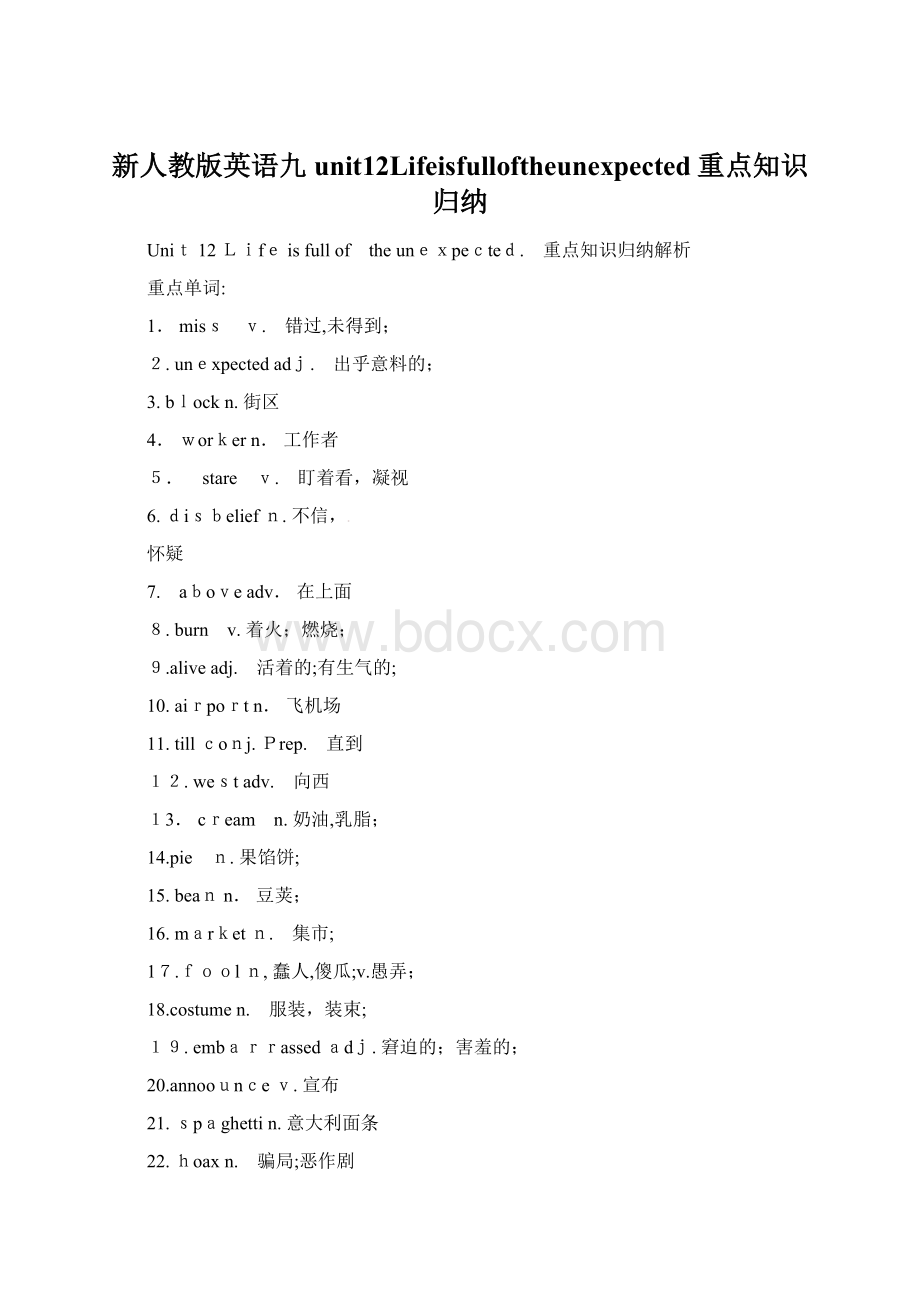新人教版英语九unit12Lifeisfulloftheunexpected重点知识归纳.docx
《新人教版英语九unit12Lifeisfulloftheunexpected重点知识归纳.docx》由会员分享,可在线阅读,更多相关《新人教版英语九unit12Lifeisfulloftheunexpected重点知识归纳.docx(17页珍藏版)》请在冰豆网上搜索。

新人教版英语九unit12Lifeisfulloftheunexpected重点知识归纳
Unit12Lifeisfullof theunexpected. 重点知识归纳解析
重点单词:
1.miss v. 错过,未得到;
2.unexpectedadj. 出乎意料的;
3.blockn.街区
4.workern.工作者
5. stare v. 盯着看,凝视
6.disbeliefn.不信,
怀疑
7. aboveadv.在上面
8.burn v.着火;燃烧;
9.aliveadj. 活着的;有生气的;
10.airportn.飞机场
11.tillconj.Prep. 直到
12.westadv. 向西
13.cream n.奶油,乳脂;
14.pie n.果馅饼;
15.beann.豆荚;
16.marketn. 集市;
17.fooln,蠢人,傻瓜;v.愚弄;
18.costumen. 服装,装束;
19.embarrassedadj.窘迫的;害羞的;
20.annoouncev.宣布
21.spaghettin.意大利面条
22.hoaxn. 骗局;恶作剧
23.discoveryn.发现,发觉;
24.ladyn.女士
25.cancelv.取消,终止;
26.officer n.军官
27.believableadj. 可相信的,可信任的;
28.disappear v.消失;不见;
29.embarrassingadj. 使人害羞的。
30.backpackn. 背包,旅行包;
31.oversleepv.睡过头;
重点词组
1.takeashower洗浴
2.leave mybackpackat home
把背包忘在家里
3.getbacktoschool返回学校
4.start teaching开始教学
5.gooff响铃
6.rush out thedoor冲出房门
7.givesbalift捎某人一程
8. missbothevents错过两个事件
9.befullof 充满
10.beabouttodosth正要做某事
11.stareindisbeliefat难以置信地盯着.
12.raiseabovetheburningbuilding
从正在燃烧的楼上升起
13.jump outof bed跳下床
14.collectthemathhomework收数学作业
15.completethe workformyboss
完成老板的工作
16.make theapplepie制作苹果馅饼
17.showup赶到,出现
18. addthe green beans加绿豆荚
19.getdressed紧张
20.handinhomework 上交作业
21.costume party化装舞会
22.takeplace发生
23. playallkindsoftricks andjokesoneach other相互开各种玩笑
24.sellout卖完,售完[来源:
学科网]
25.loseweight减肥
26. by theendofthatday到那天结束时
27.end up以…结束
28.getmarried结婚
29.hav
ea happyending有一个幸福的结局
30.fear spread across thewholecountry
恐惧席卷整个国家
31. theunluckiest
dayofmylife
一生中最不幸的一天
32.headwest向西行驶
33.in the middleof the road在路中间
34.turn around 调头
35.makean unexpected discovery
作一个出乎意料的发现
36.cancel theplan取消计划
重点句式
1.Life isfullof theunexpected.生活充满了意料之外的事。
2.Bythetime Igotup,mybrotherhad alreadygotten intheshower.当我起床时,我哥哥已经进了浴室了。
3.BythetimeIgotoutside, thebushadalreadygone.当我出来时,公汽已经走了。
4.WhenI got toschool,Irealized Ihadleft mybackpackathome.
当我到达学校时,我才意识到我把背包忘在家里了。
5. By the time I walkedintoclass,theteacherhadstartedteachingalready.当我走进教室时,老师已经开始讲课了。
6.Atleast bythetimeyougotto school,youwere only fiveminuteslate forclass.
至少当你到达学校时,你只迟到了五分钟。
7.Ikept sleeping,andwhenIwokeupit wasalready8:
00a.m.!
我一直睡,当我醒来时已经是8点整了。
8. By thetimeIarrivedattheparty,everyone elsehadalreadyshowed up.
当我到达晚会时,其他的每个人都已经到了。
9.Whenheput thenoodlesinto thebowl,herealizedhehadforgottentoaddthegreenbeans.
当他把面条放进碗里时,他意识到他忘了添加绿豆荚了。
10.Beforeshegotachance tosay goodbye,hehadgoneintothebuilding.
在她得到一个向他告别的机会之前,他已经进入楼房了。
11.Iwasabouttogo upwhenIdecided to geta coffeefirst.当我正要上楼,这时我决定先去买杯咖啡。
12.BeforeIcouldjointheothers outsidetoseewhat wasgoing on ,thefirst planehad alreadyhitmyoffice building.
在我跟着其他人一起去外面看看发生了什么之前,第一架飞机已经撞到了我办公室所在的大楼。
13.Westaredindisbeliefattheblack smokerisingabove theburningbulding,
我们直愣愣地盯着燃烧的大楼上升起的黑烟,无法相信(这一切)。
14..Mybadluckhadunexpectedlyturnedintoagoodthing.我的霉运意外地变成了一件好事。
15..WhathappenedtoDaveonApril Fool’sday?
戴夫在愚人节发生了什么?
16.IthappensonApril1steveryyearandisadaywhen many peopleplayallkindsoftricksandjokesoneach other.
它发生在每年的四月一日,这一天许多人互相之间搞恶作剧开玩笑。
17.ManyApril Fool’sjokesmayendupbeing notveryfunny.许多愚人节玩笑的结局并不是那么有趣。
18.Walles madeitsound so realthathundredsof peoplebelieved thestory,and fearspreadacrossthewholecounty.
韦尔斯让它听起来是那么真实以至于成千上万的人相信了,恐惧蔓延了整个国家。
巧记歌诀
1.非谓语动词
动词不做谓语用不定分词与动名。
to加原形不定式,词组可作名副形。
原形加上ing,动词具有名词性。
2.形容词的次序
大小形状和新老,颜色国籍出(处)材料。
大哥限描大,二哥形龄颜,小弟籍物类,同站名词前。
同学们对愚人节有不同的态度。
下面表格是你们学校的一份调查结果。
请据此,以“Attitudes toAprilFool'sDay”为题写一篇80词左右的英语短文。
Attitudes(%)
Like(40%)
Dislike(30%)
Notcare(30%)
Reasons
1.enjoyedaroundtheword
2.addpleasure tolife
1.makeothersunhappy
2.causetrouble
justplayjokes
Attitudes toAprilFool'sDay
Asurveyhas recentlybeen done at ourschool,and itshowstherearethreedifferent attitudestoAprilFool'sDay among thestudents.
40%ofthe studentsthinkthey like tohave AprilFool'sDay.Theysaythespecialday isenjoyed bypeoplearound theworld.Anditcanaddmuchpleasuretoourschoollife.
Butstill30%of themdislike AprilFool's Day.Theythinkitwoulddisturbothers toplay jokesonthemonthatday.Evenworse,mostofthe jokes maycause much trouble.Andthe restdon't care.Intheiropinion,people justplayjokes on AprilFool'sDay.
SectionA(1a~2d)
a.词汇包:
bythetime 到……时候
bythetime作连词引导时间状语从句,当从句用一般过去时,主句用过去完成时;当从句用一般现在时,主句用一般将来时或将来完成时。
By thetimehewas ten,Tombuiltachemistry labhimself.等到了十岁的时候,汤姆自己建了一个化学实验室。
I’ll bein bedbythetimeyouget home.你到家时,我已经上床睡觉了。
—Bythe time I was five,I____English.—Really?
A.hadstartedlearning B.havestartedlearningC. started tolearn D.startedlearning
【解析】by thetime所引导的从句是一般过去时,其主句要用过去完成时。
正确答案是A。
b.句式包:
1.By the time Igotoutside,thebushad alreadyleft.当我出来的时候,公共汽车已经走了。
本句是bythe time引导的时间状语从句,从句是Igotup,是一般过去时。
主句thebushadalreadyleft是过去完成时。
过去完成时表示在过去某个时间之前已经发生的动作或一直延续的动作或状态。
它表示的动作所发生的时间是“过去的过去”,常用“助动词had+过去分词”构成。
常与过去完成时连用的时间状语有:
by(theendof)+过去的时间,for+段时间,since+点时间,when引导的时间状语从句(从句中谓语动词用过去时)等。
Bytheendofthe match,theyhadkickedtwogoalsandwe hadkickedfour.
到比赛结束时,他们已踢进两个球,我们进了四个球。
”
Bythe timeshe gotup, her brotherhadalreadygonein
tothebathroom. 在她起床之前她的弟弟已经进了盥洗室。
【横向辐射】过去完成时与现在完成时的区别
过去完成时与现在完成时的主要区别是时间的参照点不同:
过去完成时的时间参照点是某个“过去的”时间;现在完成时的时间参照点是“现在”。
因此现在完成时中的很多规则,也适用于过去完成时。
WhenIgottothe cinema,the filmhad beenonforfive minutes.当我到达电影院时,电影已演了五分钟了。
(got是一个过去的“时间点”,电影“开始”在我“到达”之前,是“过去的过去”。
因为for five minutes为延续一段的时间状语,应用可延续的系表结构beon的过去完成时形式。
)
【温馨提示】过去完成时是一个相对的时态,表示的是“过去的过去”,只有在和过去某时或某动作相比较时才用到它,因此当原句中若找不到一个“过去的时间”作为参照点时,是不能用过去完成时的。
【例句】
He gottothe railwaystationand suddenlyrealizedthathehadforgottentobringhis ticket.
他到了火车站后忽然意识到他竟忘记带车票了。
(“忘记”这一动作在“意识到”这一动作之前。
)
【课堂变式】
1.—Whydidn’t yougotothe movieyesterday?
—BecauseI____it before.
A.had watchedB.haveseen C.havewatched D.hadseen
【解析】“看电影”要用动词see,所以可先排除A和C。
再由yesterday可知答话者在昨天之前就已看过这部电影,即“过去的过去”,要用过去完成时。
正确答案是D。
2.By the endoflastyear, we ____about2000 Englishwords.
A.were learning B. havelearnt C. learnt D.hadlearnt
【解析】由时间状语Bytheendoflastyear可知应用过去完成时,即“had+过去分词”。
正确答案是D。
3.Since2000,Nanchanghasbecomea new city.Everything____.
A.is changed B.waschanged C. haschanged D. hadchanged
2.Whenshegottoschool,she realizedshe hadleftherbackpackathome.当她到学校时,她意识到她把背包忘在家里了。
表示“把某物忘在某处”要用词组leavesth inaplace。
【备课例句】
I'veleftmy umbrella athome.我把伞忘在家里了。
Ileftmybook onthedesk.我把书忘在桌子上。
【横向辐射】forget
forget意为“遗忘某物”,指忘记一件具体的东西,但不能有具体的地点。
【例句】I forgotmy umbrellayesterday.我昨天忘了带伞。
Don'tforgetthecases. 别忘了带箱子。
【课堂变式】
—Boys andgirls!
Please____yourcompositions afterclass. —Oh,my God!
I ___it athome.
A.hand in,forgot B. hand in, leftC.handout,forgot D.handout,left
【解析】handin意为“上交”,handout意为“分发”。
可先排除C和D。
forget意为“遗忘某物”,指忘记一件具体的东西,但不能有具体的地点。
leave意为“遗忘某物在某处”,后应接具体的地点。
由此根据athome确定正确答案是B。
SectionA(3a~3c)
a.词汇包:
1.aboveadv.在上面
above的用法
一、作介词ﻫ1.在...上面ﻫThe moonisnowabovethetrees.月亮正位于树梢上。
2.在...之上,超过ﻫTheyarechildrenabovesixyearsold.他们是六岁以上的孩子。
ﻫ3.高于;优于;胜过ﻫInthecompany,DickranksaboveTom.在公司里,迪克的地位比汤姆高。
4.不屑于;不致于ﻫHe consideredhimself abovedoingsuchthings.他自认为是不会去做那种事的。
ﻫ二、作副词
1.在上面;向上面
Therearesnowy peaksabove.上面是白雪皑皑的群峰。
ﻫ2.(级别、数目等)更高;更大;更多ﻫMen andwomen ofeighteenand aboveareeligibletovote.
年龄在十八岁以上的男女有投票表决权。
ﻫ3.在上文ﻫSeetheexamples givenabove.见上述例子。
ﻫ三、作名词ﻫ1. 上文;上述事实Inadditiontoalloftheabove,shewon aPrizein 1980.除上述外,她还在1980年获奖。
【备课例句】Theplaneflewabovethe clouds.飞机在云层上飞行。
【横向辐射】above,on,over的用法
1.above的意思是“在…之上”,“高于…”,表示相对高度,不一定是在正上方,它的反义词是below.
例:
Theplaneflewabovetheclouds.飞机在云层上面飞行。
2.over的意思是“在…之上”,表示在垂直之上,其反义词是under.
例:
Thereis
abridgeover theriver.河上有座桥。
Thereisa boatunder the bridge.桥下有一只船。
3.on的意思是“在…上面”,表示与表面接触。
例:
He putthe bookon thedesk.他把书放在课桌上。
【课堂变式】
Iceisnotoftenseenherein winter as thetempera
turenormally stays zero.
A.upﻩ
B. down C.aboveﻩﻩD.below
【解析】本题考查介词词义辨析。
up在……的上面;down在……的下面;above在上面;below在下面。
句意为“这儿冬天很少看到冰,因为气温正常在零度以上。
stayabovezero在零度以上。
故选C。
2.aliveadj.活着的;有生气的;
alive,living与live
1.alive 主要用作表语(有时可用作后置定语,但不用作前置定语),可用于人或动物。
如:
Hemustbestill alive. 他一定还活着。
注:
若alive本身有修饰语,则也可用作前置定语。
如:
Heisareallyalivestudent. 他的确是一个十分活跃的学生。
2.living可用作表语或定语,可用于人或物。
如:
Areyour grandparentsstillliving?
你的祖父母还健在吗?
alive和living表示“活着的”,两者含义很接近,只要句法适合,有时可互换。
如:
谁是当代最伟大的诗人?
正:
Who is thegreatestlivingpoet?
正:
Whoisthegreatest poetalive?
若需严格区分,两者仍有差别:
living通常是客观描述某人“尚在人间”或“健在”,而alive则主要指生与死的“界限”。
如:
HewasstillalivewhenIreachedthe hospital.当我赶到医院时他还活着。
3.live通常只用作定语(前置),可用于动物或植物,但一般不用于人。
如:
He boughtsomelive fish.他买了几条活鱼。
Onlya few livetreeswere leftafterthefire.火灾之后只剩下几棵树还活着
【课堂变式】
Don’t betoosad,weshouldfeelluckytobe _____ (live).
【解析】考查形容词,由句意可知。
我们应当感到幸运我们活着,be alive表示活着的状态。
故填alive
SectionA(Grammarfocus~4c)
a.词汇包:
1.empty(adj.)空的;空闲的(v.)排空;倒出
1.作形容词,常用表语或定语,此时其反义词是full。
【备课例句】
Hetook his empty coffee cupbacktothecounter.他把空咖啡杯送回到柜台。
Wewalkedintheemptystreet. 我们走在空旷的街上。
2.作动词,后常接宾语,此时其反义词是fill。
【备课例句】
He emptied histoolbag.他腾出自己的工具袋。
She emptied thebox.她倒空了箱子。
【课堂变式】
Thedustbinswon’t____becausetheyare____now.
A.empty; empty B.beemptied;emptyC.emptied; emptiedD. empty; beemptied
【解析】前一空e
mpty是动
词,用被动语态。
后一空empty是形容词。
正确答案是B。
2.showup出席;露面
【备课例句】Why didn'tyoushow up atthemee